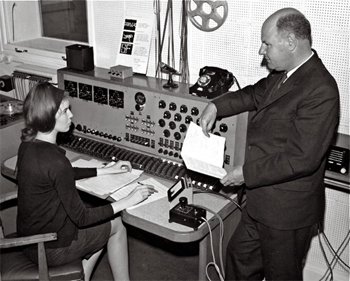Members of the BBC Radiophonic Workshop are to perform together at the Roundhouse this Sunday, the 17th of May as part of the Short Circuit festival of electronic music. The event is taking "by popular demand", but this, of course, hardly refers to the Roundhouse caving in to petitions and protests on Chalk Farm Road.
There are no hit songs in the BBC Radiophonic Workshop’s oeuvre – their one dalliance with the pop world came with Maddalena Fagandini’s collaboration with George Martin under the name Ray Cathode which, despite some favourable radio play, did not perform well in the charts. Nor is there a star player, for the Radiophonic Workshop had no stars. And before you mention her, Delia Derbyshire’s modern day cult status is almost entirely posthumous, and she wasn’t even credited for her most famous piece of music, the Dr Who theme.
No, the "by popular demand" refers to the collection of vintage analogue synthesizers being trucked into the former engine shed this weekend. One almost gets the impression that, having spent decades struggling with old war surplus equipment, cast-offs considered obsolete by other BBC departments, tape decks that took half a day to get up to speed and synthesizers that went out of tune on a warm day; they might’ve been happier using newer models for the (sort of) reunion gig.
During its own lifetime, the Radiophonic Workshop was largely dismissed by the world of serious music and ignored or regarded merely as a cheap source of sound effects by the rest of the BBC, but since its demise it has been widely hailed as a major influence on the development of everything from synth pop to hardcore rave. Unlike other influential groups to have made a comeback recently, though, this will be only the second time members of the Workshop have performed together onstage. The first time was back in May 1971 for the annual convention of the Institute of Electrical Engineers – and of those onstage thirty-eight years ago, only two (Dick Mills and Paddy Kingsland) will be taking part in this weekend’s event. They’ll be joined by two other composers from the Workshop’s later years, Peter Howell and Roger Limb, plus its archivist, Mark Ayres, as well as live horns and rhythm sections. So far from being a historical re-enactment of some past event, Sunday’s performance ought to be a rather unique occasion, the very first live performance of pieces of music already considered classic.
Interviewed a couple of years ago, Dick Mills claimed that, due to the highly experimental nature of the work they produced, most of the music made at the Radiophonic Workshop would be near impossible to recreate. Nonetheless, Sunday’s programme promises a mixture of new and old material, spanning the department’s entire history, from Doctor Who to the Hitchikers’ Guide to the Galaxy, as well as special sounds and sonic set pieces from children’s TV to scientific documentaries. It is this extraordinary variety of output, and the Workshop’s status as a "service department" for the BBC, that Mills thinks set it apart from other electronic music studios in Europe, "All our ‘experimenting’ was done in the context of a production demand: we never decided, for instance, this month we’re going to investigate voice treatment or try to discover how many fragments of notes we could extract from an octave. The most important thing was to be faithful to the brief. But because, in radio programmes, especially schools broadcasts, you had to provide your own ‘mental scenery,’ it was quite easy to use non-familiar sounds and atmospheres that listeners would accept more readily than they would in other contexts."
For more information about the Short Circuit festival, visit the Roundhouse website


